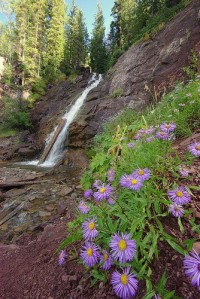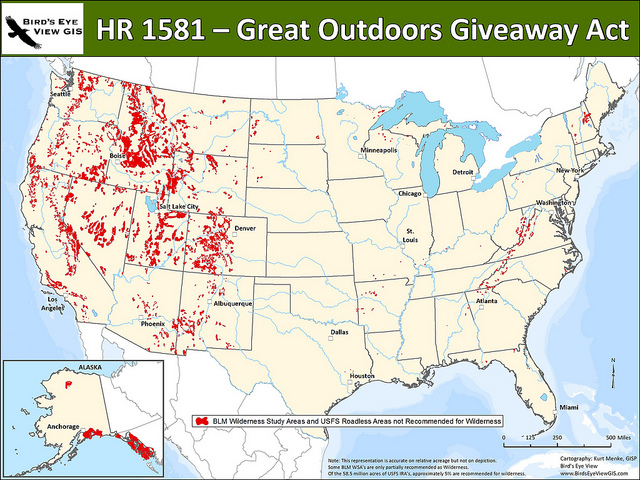 Do you want to see this waterfall get fracked? If not, tell Congress to protect the San Miguel Peak and other roadless areas.Photo: Adam BakerTens of millions of acres of public land would lose protection under the Wilderness and Roadless Release Act of 2011, now being considered in the U.S. House. These parcels, currently designated as wilderness study areas or roadless areas, would be stripped of their status and potentially opened up for drilling, fracking, and mining.
Do you want to see this waterfall get fracked? If not, tell Congress to protect the San Miguel Peak and other roadless areas.Photo: Adam BakerTens of millions of acres of public land would lose protection under the Wilderness and Roadless Release Act of 2011, now being considered in the U.S. House. These parcels, currently designated as wilderness study areas or roadless areas, would be stripped of their status and potentially opened up for drilling, fracking, and mining.
Republicans on the House Energy and Natural Resources Committee last week brought in a carefully choreographed parade of witnesses, including disabled veteran hunters, to create the illusion of diverse, patriotic support for the bill. In reality, the disabled hunters are merely a prop hiding the fossil-fueled real interests behind H.R. 1581.
Only Congress can designate land as federally protected wilderness, but federal agencies have inventoried their public lands to determine which are suitable for wilderness — “wilderness study areas” — so they can be preserved until such time as Congress may act. The Bureau of Land Management has identified about 12 million acres in 550 areas as wilderness study areas. Separately, the Forest Service has identified 15 million acres for study, although they have not been given interim protection, while the Clinton administration issued the Roadless Rule prohibiting new roads on nearly 60 million acres of Forest Service land. Since then, the Roadless Rule has been a political football: undone by the Bush administration, reinstated (more or less) as the Obama administration’s “Wild Lands” policy, then funds for same blocked by the GOP-controlled 112th Congress.
Even in wilderness study/roadless areas, people can hike, fish, ride mountain bikes, hunt, and ride off-road vehicles. Let me repeat that for emphasis: People can hunt in wilderness study/roadless areas. People can ride off-road vehicles in wilderness study/roadless areas. They just can’t drive a van onto a paved road into a roadless area, park it in a handicapped parking spot, and then hunt. And apparently that really bothers House Republicans.
A broad coalition of wilderness and wildlife groups opposes H.R. 1581, calling it the Great Outdoors Giveaway. The Obama administration strongly opposes the bill too.

Bruce Babbitt, secretary of the interior during the Clinton administration, testified against the bill. “Simply put, it trades protection of wildlife habitat, clean water and clean air for corporate profits. It is nothing more than a giveaway of our great outdoors,” Babbitt said.
The Salt Lake Tribune calls it an awful land bill: “No consideration would be given to any particular parcel, regardless of its value for recreation, watershed, wildlife or cultural antiquities. No suggestions from local groups would be considered, such as the discussions going on in San Juan County now over what lands qualify for wilderness designation. This bill would simply erase the years spent by many hundreds of people to categorize millions of acres according to their particular values.”
So what’s really going on? If this bill were simply about disabled hunters, small exceptions and exemptions could be written. But the fact that the Independent Oil Producers’ Agency supports the bill gives you a clue as to who’s really behind it: fossil-fuel companies that want access to oil, gas, and coal on public land.
 Consider the case of Utah’s Turtle Canyon, a wilderness study area. The proposed Lila Canyon coal mine, bordering the canyon, is said to be one of the last high-quality coal deposits in the state, with a conservative estimate of 37 million tons of coal. Its owner would pay royalties to the state and Emery County. In 2010, Utah coal sold for $30.77 per ton [PDF], so the mine could be worth $1,138,490,000 if all the coal could be extracted at 2010 prices. Not surprisingly, Emery County officials want Turtle Canyon released from its classification as a wilderness study area. H.R. 1581 would do that and release many more areas too, shown in dark green on the map to the right.
Consider the case of Utah’s Turtle Canyon, a wilderness study area. The proposed Lila Canyon coal mine, bordering the canyon, is said to be one of the last high-quality coal deposits in the state, with a conservative estimate of 37 million tons of coal. Its owner would pay royalties to the state and Emery County. In 2010, Utah coal sold for $30.77 per ton [PDF], so the mine could be worth $1,138,490,000 if all the coal could be extracted at 2010 prices. Not surprisingly, Emery County officials want Turtle Canyon released from its classification as a wilderness study area. H.R. 1581 would do that and release many more areas too, shown in dark green on the map to the right.
How big are the fossil-fuel deposits in wilderness study/roadless areas? There’s not a lot of info out there. A 2001 study [PDF] by the Bureau of Land Management found that the Clinton-era Roadless Rule prevented access to a lot of natural gas in the Greater Green River Basin of southern Wyoming and northwestern Colorado — 29 percent of the estimated 116 trillion cubic feet underlying federal lands in the region. But a broader 2002 report [PDF] by the Wilderness Society concluded that the economically recoverable gas under all Roadless Rule areas of the West would only meet America’s need for natural gas for nine to 11 weeks.
The natural gas industry has changed dramatically since 2002. The Cheney-lobbyist-written Energy Policy Act of 2005 exempted natural-gas fracking from certain clean water laws. The price of natural gas has doubled from $2.17 per thousand cubic feet to above $4 per thousand cubic feet. New oil and gas finds have been made in North Dakota, Montana, and California’s Kern County, among other places. In particular, the practice of fracking has created both a natural gas boom and bubble, causing the Securities & Exchange Commission to subpoena energy companies for possibly inflated statements regarding productivity of shale gas wells.
The millions of acres to be released by H.R. 1581 could then be leased to oil, gas, coal, and other commercial interests, no doubt at below-market rates. Coal would be mined. Oil would be drilled. Natural gas would be fracked. And these activities would have a horrendous, as-yet-uncalculated impact on climate (natural gas, which is largely methane, may have a higher carbon footprint than coal [PDF]).
H.R. 1581 would let the oil, gas, and coal industries drill, undermine, spill, frack, and suck the marrow out of lands owned by the American public, for their private profit and to our sorrow.



